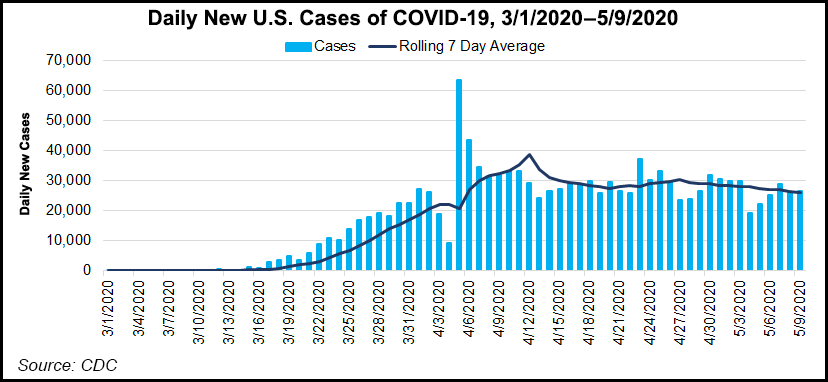Regulatory | Infrastructure | NGI All News Access
Public Power Utilities Seeking Direct Federal Aid to Keep Lights on Amid Pandemic
Non-profit public power utilities, which supply electricity to 49 million people and 2.6 million businesses in the United States, are seeking direct aid from the federal government to mitigate the financial impacts of the Covid-19 pandemic.

In a letter to congressional leaders Friday, American Public Power Association (APPA) CEO Joy Ditto warned of a “double-edged challenge” facing the public utility industry due to the coronavirus.
“On the one hand, public power utilities are taking extraordinary measures to protect workers and customers from infection while keeping electric service reliable,” Ditto said. “On the other hand, revenues are declining as power usage overall declines and an increasing number of customers are unable to pay their bills.”
Ditto said APPA can confirm that about 1,700 of the country’s 1,927 public power distribution utilities have imposed a moratorium on service shutoffs to ensure supply for the millions of end-users who are jobless or otherwise struggling amid the pandemic.
Since public utilities are non-profit and publicly owned, all the costs of providing services are included in the rates they charge for electricity, Ditto said.
She said that while it may take several months for the full impact on utilities to become apparent, “the trendline today is clear and troubling. We have some members facing that outlook with only 30 days of cash-on-hand and are worried they will be faced with the choice of having to furlough staff, not pay their own bills, or increase electric rates.”
While the sector’s logistical and operational concerns are being addressed through interactions with stakeholders and federal regulators, “our members’ financial concerns must be dealt with through the provision of direct aid to public power utilities,” Ditto said. “This will help alleviate the working capital shortfalls caused by the pandemic, including payment delinquencies by individuals, small businesses, and industries hard hit by the economic consequences of Covid-19.”
APPA also is asking legislators to approve additional funding for the Low Income Home Energy Assistance Program; expand public utilities’ access to long-term financing; and allow public utilities to access the relief measures and financing options afforded to small businesses under the CARES Act and the Families First Coronavirus Response Act, since most public utilities would be considered small businesses under the Small Business Administration’s size standards.
In a recent research note, analysts at Moody’s Investors Service said the firm is maintaining a stable outlook for U.S. public power utilities through the pandemic, but warned the outlook could be revised to negative if stay-at-home orders and the closure of non-essential businesses remain in effect for an extended period of time.
On Monday, the April 2020 Survey of Consumer Expectations published by the Federal Reserve Bank of New York showed the perceived probability of losing one’s job reaching an all-time high for the second consecutive month, while expected earnings income and spending growth each hit all-time lows as well.
For the week ended May 2, Labor Department data show that seasonally adjusted initial jobless claims totaled 3.17 million, versus 225,000 in the similar 2019 week.
© 2024 Natural Gas Intelligence. All rights reserved.
ISSN © 1532-1231 | ISSN © 2577-9877 |
